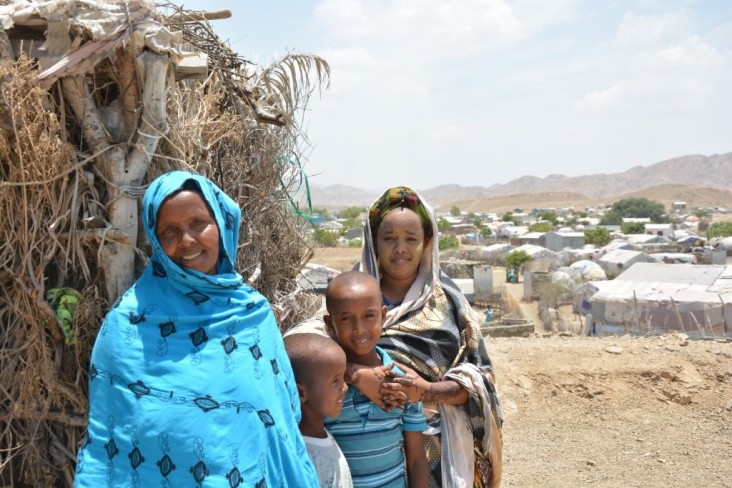Speeches Shim

January 2018—Djibouti—a small, desert-like country in East Africa—is home to fewer than 1 million people and chronically food insecure. Currently a haven to 27,000 refugees who have fled violence and insecurity in their own countries, the strain on resources is more pronounced as the country struggles to feed everyone in need.
Some refugees are finding hope despite it all, like Khadija Ahmed Abdi*, a mother of six who fled war in Somalia, and who now has access to nutritious food through a USAID-supported program.
Originating from Ethiopia, Eritrea, Somalia and, more recently, Yemen, the vast majority of refugees in Djibouti reside in camps in the Ali Sabieh and Obock regions, where they rely entirely on humanitarian assistance to meet basic needs. With USAID support, the U.N. World Food Program (WFP) provides refugees in Djibouti with a combination of food and cash-based assistance to help them improve their nutrition, all while supporting the development of the local economies by enabling them to purchase foods of their choice at local markets.
Each month, Abdi receives a basket of U.S.-grown wheat flour, split peas and vegetable oil, and a small cash supplement that she can use to purchase foods—such as milk, vegetables, meat, rice or potatoes—at local markets. The combination of the food basket and the diverse foods she purchases at markets has allowed Abdi to regain her health so she can provide for her family by making and selling handkerchiefs and handbags.
If Abdi cannot return to Somalia, one day, she hopes to own a sewing workshop in Djibouti, like one she and her husband used to manage back in Somalia.
“When I arrived here, it was difficult,” says Abdi. “I couldn’t have a normal life anymore.” However, she now feels hopeful about a healthier future.
“Now our situation is better and I can choose what my family and I eat,” adds Abdi. “Having familiar foods on our plates feels a lot like home.” Today she can also earn an income while her two young boys, Hanas and Dini, attend primary school.
Other refugees, like Safia Muhamed Aden*, also share more positive outlooks thanks to the support they receive from USAID and WFP. Aden left conflict-ridden southern Somalia in 2010 as the country headed toward famine. She is now able to support her five children through her job delivering water to the camps three times a day. The food and cash-based assistance has allowed her to work to provide for her family, including enabling her to purchase a donkey to help her transport the water.
In 2017, WFP reached more than 50,000 people in Djibouti, including 19,000 refugees like Abdi and Aden, with critical food and nutrition assistance. WFP activities also provide children under 5 years old and pregnant and lactating women with specialized nutritious foods for the treatment and prevention of acute malnutrition. With the help of ongoing USAID food assistance, the global acute malnutrition level in the Ali Addeh refugee camp dropped from 10 percent in 2015 to less than 6 percent in 2017. Better health and income-earning opportunities are restoring hope for refugees.
LINKS
Follow @USAIDEastAfrica, on Facebook
*Name changed to protect identity.

Comment
Make a general inquiry or suggest an improvement.